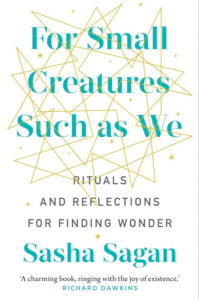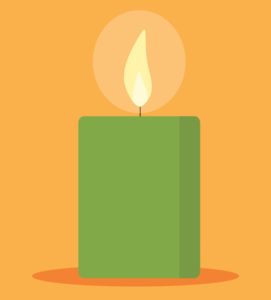For Small Creatures Such as We: Rituals for Finding Meaning in Our Unlikely World

BY SASHA SAGAN
G.P. PUTNAM’S SONS, 2019
Life is worth celebrating and we should take the time to celebrate family, friendships, ourselves, milestones, and the wonders of the universe. This is the message of Sasha Sagan’s book, For Small Creatures Such as We: Rituals for Finding Meaning in Our Unlikely World, and I couldn’t agree more. Since the beginning of time, humans have been celebrating cosmic and seasonal events, lifecycle milestones, heroes, and myriad other things. Religious institutions have codified celebration into their belief systems by creating rituals and traditions that bind their flocks together. As an atheist and the daughter of Carl Sagan and Ann Druyan, Sagan has struggled with the absence of humanist celebrations. “[T]he biggest drawback to being secular is the lack of a shared culture,” she writes. “I can live without a god or shared afterlife but I can’t live without celebration, community, and ritual.”
Inspired by the birth of her daughter Helena and her new role as mother and parent, this book is both a personal journey and an argument for incorporating more celebrations into our lives. Religious celebrations and their corresponding rituals can represent a connection to the past and, when practiced as secular traditions, may provide a cohesive glue within families and communities. For Sagan, the lighting of candles on Friday or participation in Christmas with her in-laws provides a historical legacy important to both branches of her family. By lighting candles, she feels closer to her Jewish great grandparents who also participated in this practice. And while she doesn’t share a similar affinity towards Christmas because it’s not a holiday her family celebrated, she feels it’s important to give Helena this experience as a way to connect with her husband’s family traditions.
 On this point, Sagan highlights not only a serious dilemma that many of us can identify with but also the rationale behind our chosen resolution to celebrate these religious holidays as secular events in order to be with our families. Phil Zuckerman explains a similar decision in his book, Living the Secular Life, and while I chose this same path, I remain a little conflicted still to this day. By celebrating these religious holidays as secular events, do we continue to give them the emotional context that perpetuates their theistic nature? Sagan’s implied perspective is to not view these choices as a zero-sum decision. Instead, she not only encourages but exhorts us to be creative in the design of our own celebrations and traditions. We can celebrate both the tradition and our own worldview, she says.
On this point, Sagan highlights not only a serious dilemma that many of us can identify with but also the rationale behind our chosen resolution to celebrate these religious holidays as secular events in order to be with our families. Phil Zuckerman explains a similar decision in his book, Living the Secular Life, and while I chose this same path, I remain a little conflicted still to this day. By celebrating these religious holidays as secular events, do we continue to give them the emotional context that perpetuates their theistic nature? Sagan’s implied perspective is to not view these choices as a zero-sum decision. Instead, she not only encourages but exhorts us to be creative in the design of our own celebrations and traditions. We can celebrate both the tradition and our own worldview, she says.
Sagan’s book is written with an infectious enthusiasm for the importance of finding opportunities to distinguish our days with celebrations and for creating new traditions within our family unit or an extended community of friends, family, and strangers. As she writes, “It’s one of the hardest parts of being secular: you have to work to congregate.” She establishes a monthly meeting of her female friends which she calls the “Ladies Dining Society.” The group succeeds for several years and spin-offs are established when members move to other cities. Eventually, the New York group is disbanded when too many of its original members leave town. Lamenting that the tradition she worked so hard to build slipped away, Sagan encouragingly observes, “just as easily as these traditions fall away, new ones can begin.” This is the vision of the Meetup community built around shared interests: it’s often short lived or constantly changing.
I too cannot live without celebrations and community, but I don’t think secular humanists lack a cultural identity. On the contrary, I believe we share a strong cultural identity around a belief in rational thinking, human agency, the scientific method, social justice based on democratic principles, freedom of artistic expression, respect for the environment, and awe of the universe. The trouble is, I see both a reluctance and a lack of imagination to externalize our shared values and beliefs in community-wide celebrations. We find it easy to celebrate seasonal markers such as the solstice, and International Darwin Day has become a popular community celebration to support science, but does it promote a cultural identity within the secular community? Can we write the stories (as I argue are needed) to build a secular community with a tradition of secular holidays?
In a chapter titled “Independence Days,” Sagan describes an encounter she had with a young Orthodox Jewish student when she was teaching in an afterschool program for at-risk youth. He eagerly wants her to teach him everything about history, telling her his school has taught him “nothing.” Taken aback, she tells him that while she is also Jewish, she’s a nonbeliever. He admits that he is too. She soon understands and expresses admiration for his daring to question the version of history he is being taught. “That is the story of so much of the history of the world,” she writes, “and the heart of so many national independence days.” From there she engages the reader in an insightful discussion of how everything from political revolutions to scientific breakthroughs to self-discovery to a definition of patriotism are born out of the same guiding fundamental question: “Why are things as they are?” Independence days, she says, should become “that appointed time to question, the moment when our minds break free from the absolute monarchies of ‘just the way things are.’”
The title of Sagan’s book is taken from a famous quote by her father: “For small creatures such as we, the vastness is bearable only through love.” Her book, filled with anecdotes and the wonderment for the universe she shares with her parents, is a beautiful love letter to her father, Carl Sagan, who died in 1996 when she was just fourteen years old. His death left her with a longing and emptiness that draws her back each year on the anniversary (December 20, near the winter solstice) to his graveside in Ithaca, New York.
“I try to build my own philosophy, but it is, as this book attests, overwhelmingly the philosophy of my parents,” she writes. “[Y]ou will find in my book many of the same themes and concepts.” What you will also find in this deeply personal book are the musings of a young secular woman and new mother as she wrestles with the challenges of imbuing our days with meaning, sustaining a cultural identity and family legacy, and establishing community within a secular world.
